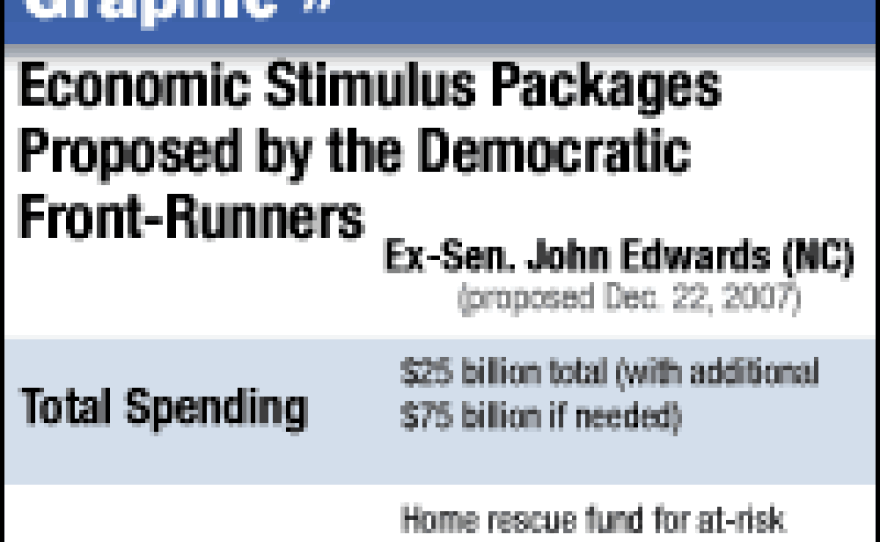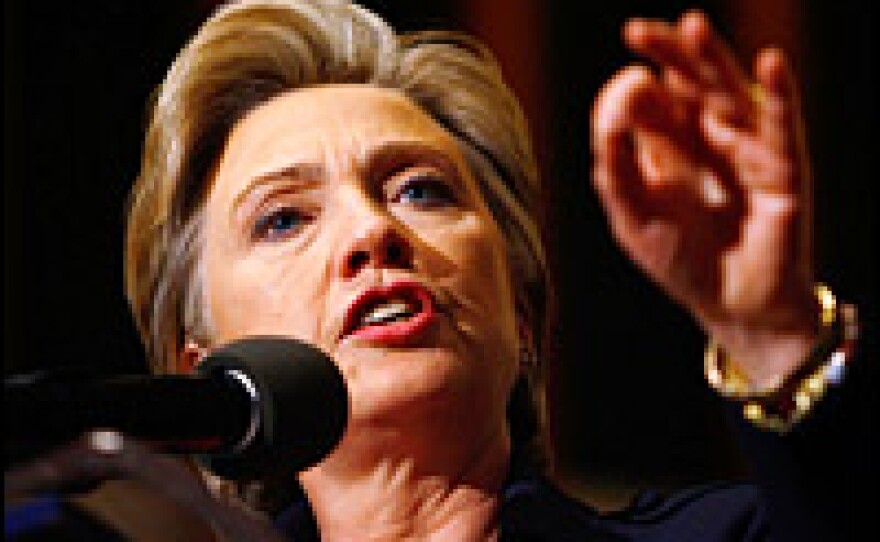
Voters are gearing up for presidential caucuses in Nevada, where the Democratic contest is fierce and tight. Polls suggest a close race between Barack Obama, John Edwards and Hillary Clinton in Saturday's voting.
The economy has been a big topic, with all the candidates proposing their own economic stimulus packages.
Sen. Hillary Clinton (D-NY) tells Robert Siegel that the Bush administration's stimulus plan will "shortchange 50 million Americans who most need the economic shot in the arm."
Clinton defines those 50 million people as lower-income senior citizens on fixed incomes and a disproportionate number of African-American and Hispanic families who are not paying taxes.
The Bush plan includes tax rebates, which would not benefit these groups.
Help for Borrowers
Clinton also believes that the government should intervene in the mortgage crisis. She proposes sending $30 billion in federal funds to the states to help them fight mortgage foreclosures.
"Certainly, there is enough blame to go around, from the big Wall Street banks that are now laying people off and taking these big write-downs, to people who may have bought more house or assumed more debt than they should have in the first place.
"But I think we have to recognize that the weakening housing market actually impacts everybody, it's not just those who got in over their head, it's the neighbors and the community who are going to have vacant homes in their midst and it's the communities that won't have the property tax base," Clinton says.
She says a moratorium on foreclosures for 90 days would be preferable to continuing to increase the interest rates. She also believes that freezing interest rates for five years would have a "stimulative effect" on the economy.
"There is a moral hazard [in intervening], but there's also a very severe moral and economic hazard from standing by and watching this further deteriorate," Clinton says.
The senator says many of the people suffering as a result of the subprime lending debacle were catapulted into higher interest rates for "trying to do the right thing" — by paying more than their monthly mortgage payment, and thus triggering a pre-payment penalty and higher interest rates.
"I think everybody has egg on their face, and everybody's going to have to give a little, but why should the brunt of this crisis fall on the back of people who thought they were doing the right thing?" she says.
'No Crisis in Social Security'
Clinton disagrees with her opponent Barack Obama on the issue of a cap on Social Security taxes. She says Obama has advocated lifting the cap from the current income level of $97,500 to incomes of $200,000 to $250,000.
It's a move she opposes: In high-wage areas, the bump to a cap of $200,000 would affect people who are "not rich," such as school superintendents and fire department lieutenants.
"I will not raise taxes on middle-class and working families. The payroll tax is a huge percent of the income of a lot of people," Clinton says.
"We don't have a crisis in Social Security. We have long-term challenges that I believe can be met with relatively minor adjustments, as long as they are progressive and not imposing further burdens on people who should not be asked to bear the brunt," she says.
Copyright 2022 NPR. To see more, visit https://www.npr.org. 9(MDAzMjM2NDYzMDEyMzc1Njk5NjAxNzY3OQ001))






